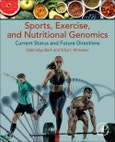Sports, Exercise, and Nutritional Genomics: Current Status and Future Directions is the first reference volume to offer a holistic examination of omics-driven advances across different aspects of exercise and sports physiology, biochemistry, sports medicine, psychology, anthropology, and sports nutrition; and highlighting the opportunities towards advance personalized training and athlete health management. More than 70 international experts from 14 countries have discussed key exercise and sport-related themes through the prism of genomics, epigenomics, transcriptomics, proteomics, metabolomics, telomere biology, talent in sport, individual differences in response to regular physical activity, that in the future may empower coaches, sports physicians, fitness experts, genetic counselors, and translational scientists to employ various omics data and approaches in improving health and physical performance of people participating in sports and exercise activities.
Contributors address current knowledge of genetic influence on athletic performance, individual responses to exercise training, as well as the genetics of musculoskeletal phenotypes, exercise-related injuries, flexibility, and neurodegenerative disorders in athletes.
Finally, performance-related and psychological traits associated with epigenetic, transcriptomic and metagenomic biomarkers are also considered, along with nutritional and pharmacogenomic aids in sports medicine and personalized nutrition.
Please Note: This is an On Demand product, delivery may take up to 11 working days after payment has been received.
Table of Contents
SECTION I. SPORTS GENETICS 1. Introduction to genetics of sport and exercise 2. Heritability estimates of physical performance-related phenotypes 3. Genes and power athlete status 4. Genetic profile of elite endurance athletes 5. Genetics of team sports 6. Variation of Mitochondrial DNA and elite athletic performance 7. Psychogenetics and sport
SECTION II. EXERCISE GENETICS AND MOLECULAR PHYSIOLOGY 8. Genes and response to aerobic training 9. Effect of gene polymorphisms on sensitivity to resistance training 10. Exercise and DNA methylation in skeletal muscle 11. Genes and individual responsiveness to exercise-induced fat loss
SECTION III. GENETICS OF MUSCULOSKELETAL EXERCISE-RELATED PHENOTYPES 12. Genetic and epigenetic determinants of muscle mass 13. Genetics of flexibility 14. Genetics of muscle fiber composition
SECTION IV. GENETICS OF SPORT-RELATED DISEASES AND MEDICAL CONDITIONS 15. Genetics of musculoskeletal soft tissue injuries: Current status, challenges, and future directions 16. Genetics of sport-related concussion 17. The genetic association with exercise-induced muscle damage and muscle injury risk
SECTION V. NUTRIGENETICS, PHARMACOGENETICS AND METABOLOMICS IN SPORT AND EXERCISE 18. Personalized sports nutrition: Role of nutrients in athletic performance 19. Metabolomics and proteomics as tools to advance the understanding of exercise responses: The emerging role of gut microbiota in athlete health and performance 20. The future of genetically based nutritional and pharmacological ergogenic aids in sport 21. Perspectives of personalized weight loss interventions based on exercise genomics, nutrigenetic, epigenetic, and metagenomic data in fitness and sport
Authors
Debmalya Barh Federal University of Minas GeraisBelo Horizonte
Brazil. Dr. Debmalya Barh is the Founder and Principal Scientist of Institute of Integrative Omics and Applied Biotechnology (IIOAB), INDIA. He is having 15+ years leading academic, healthcare, molecular diagnostic, and bioinformatics industry experience and an expert in integrative omics-based biomarkers, targets and targeted drug discovery, and personalized medicine in cancers and various complex diseases. He works with more than 400 scientists from 100+ top ranked organizations across 40+ countries and has 220+ publications and a branded editor for 10+ cutting-edge omics related reference books. He is a reviewer of journals from Nature publications, Elsevier and AACR Journals, CMAJ, NAR, Molecular Medicine, Gene Therapy, BMC Series, Bioinformatics, PLOS etc. Due to his significant contribution in the field; he has been recognized by Who's Who in the World and Limca Book of Records. Ildus I. Ahmetov Senior lecturer in Genetics and Epigenetics of the Research Institute for Sport and Exercise Sciences, Liverpool John Moores University, UK. Senior lecturer in Genetics and Epigenetics of the Research Institute for Sport and Exercise Sciences, Liverpool John Moores University, UK. He worked for 15 years in the top research centers of sport science in Russia, collected DNA samples of more than 8000 professional athletes, and published over 150 peer-referred research papers in journals. Dr. Ahmetov's main research areas include exercise and sports genomics, exercise biochemistry and physiology, behavioral genetics, nutrigenetics, sports medicine, and genetics of obesity. His group was the first to publish a genome-wide association study on athletic performance. Dr. Ahmetov is a member of the Steering Committee of the Athlome Consortium. In addition, he is an associate editor of the journal Biology of Sport.








